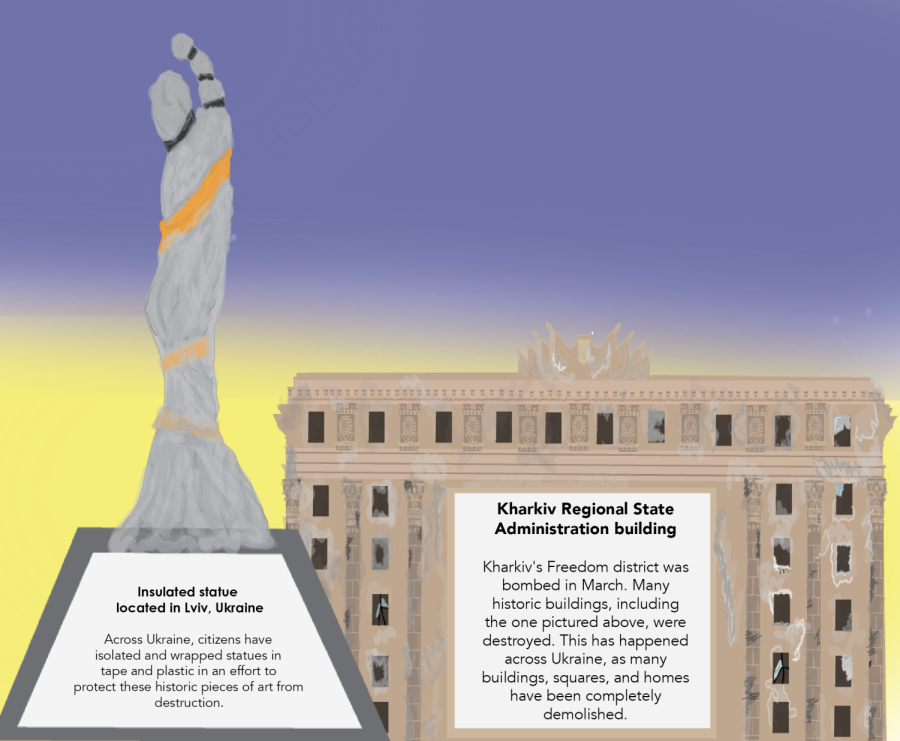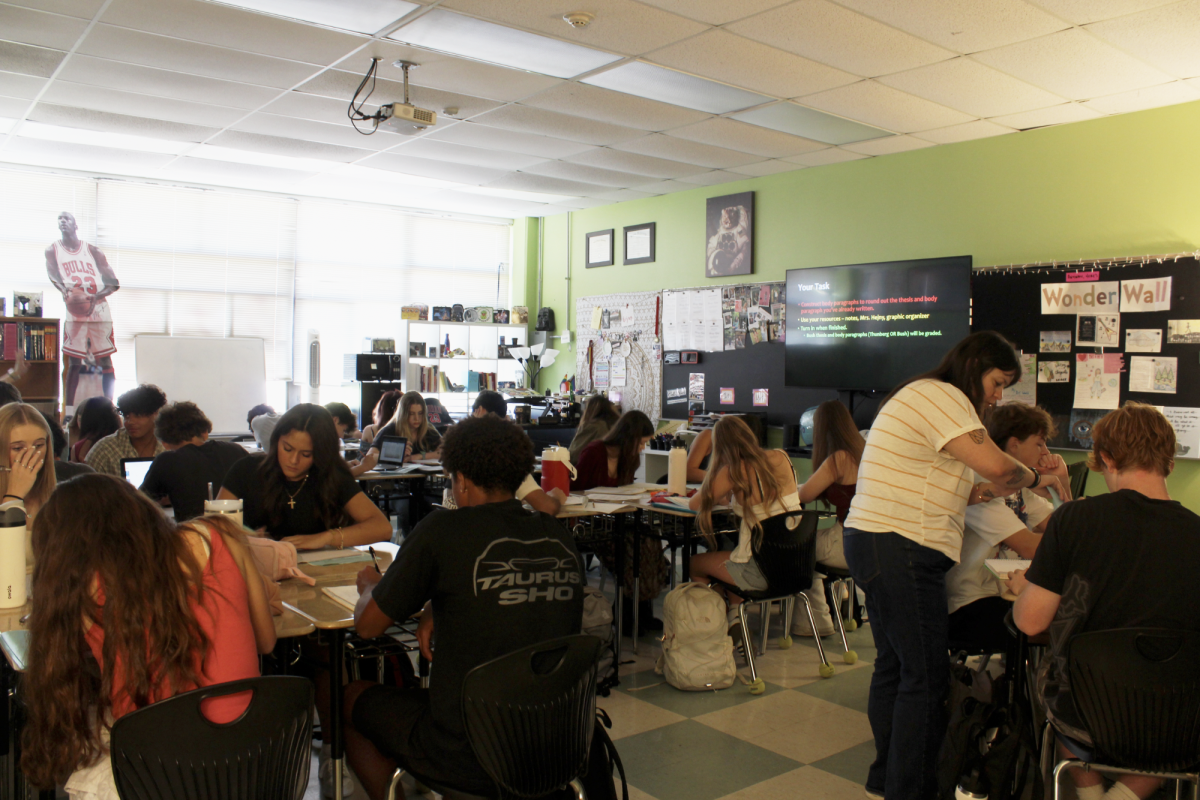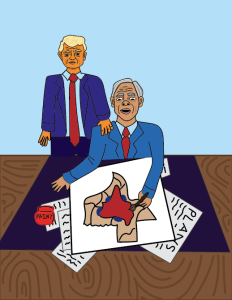Russia-Ukraine war impacts students
Ukrainians across the world worry for their families and citizens that are still living in Ukraine
On Feb. 24, after a week of Russian troops waiting on the Ukraine border, Putin chose to move forward with invasion and send in troops to attempt to gain control of the capital city Kyiv, and ultimately the rest of the country.
April 20, 2022
After years of threats and attempts at peace negotiations, the world watched in February as Russian troops invaded Ukraine. What felt like a dream was a reality for thousands of Ukrainian citizens as they fled their homes in search of refuge from neighboring countries.
On Feb. 24, after a week of Russian troops waiting on the Ukraine border, Putin chose to move forward with invasion and send in troops to attempt to gain control of the capital city Kyiv, and ultimately the rest of the country. Neighboring countries, like Poland, opened their borders to take in as many refugees as possible.
“When I first saw this news I thought it was pretty disheartening,” senior Brodi Tokar said. “Even if I had Ukrainian heritage or not, I think the fact that people want to do such cruel things to humans and cultures and countries is just really horrific.”
As Ukrainians across the world watched this conflict unfold, families desperately tried to get in contact with their loved ones and were left pondering if they had gotten to safety or not. Countries across Eastern Europe opened their borders to the Ukrainian refugees, but citizens between the ages 18 and 60 were prohibited from leaving the country to possibly fight.
“Having family there is very hard because just trying to be in contact with them in general is tough,” Tokar said. “With all this crisis going on, we tried to reach out ASAP just to see how everyone’s doing. Luckily, when we reached out initially they were safe. As far as I know right now, they are still safe, so I’m hoping it stays like that.”
Tokar has several family members that never immigrated to other countries and are still living in Ukraine. Part of his family was able to flee the Ukraine and enter Poland, but several members of his family were forced to stay as they were of fighting age per Ukraine’s emigration restrictions.
“My dad was born in Odessa, Ukraine, and so his whole side of the family is where I get my Ukrainian heritage,” Tokar said. “He was born there and grew up in Odessa for a couple of years. My dad and the rest of his family immigrated to the United States because of USSR rule and it just wasn’t safe for them to stay there.”
In 2014 Russia invaded the Ukrainian peninsula of Crimea, which was then formally annexed by Russia a few months after its occupation. Following this NATO and the rest of the world were fearful of Russia attempting to occupy more Ukrainian territory.
“It’s dangerous to rationalize a decision that is irrational in so many ways,” AP government teacher Dalton Pool said. “My best guesses as to why Putin made such a poor decision are that he is perturbed by Ukraine embracing western democracy, concerned about NATO expanding into Ukraine, and wants control of strategic land and sea locations especially in eastern Ukraine.”
Putin has not indicated that Ukraine is the only country that he will try to occupy. This has made several former Soviet countries that are now independent and fearful that if Russia successfully gains control of the Ukraine that they may be next.
“The ego of a billionaire autocrat who’s been in power for multiple decades most likely played a factor in why Putin moved forward with invasion,” Pool said. “Putin is aging and thinking about his legacy and has always wanted to restore Russia to its peak Soviet Union power.”
In the week following Russia’s invasion, the Western world moved forward with historic economic sanctions. This includes blocking Russia from international markets, as well as prohibiting many companies from doing business with them.
“Right now NATO, the U.S., and European Countries are doing about as much as they can get away with to help Ukraine,” Pool said. “The sanctions levied against Russia are severe and have had an effect, but until Europe stops buying natural gas from Russia it will be able to stay afloat economically.”
Another Bowie student who is grappling with fear of her family’s safety over this war is senior Anastasia Krasnoriadtsev. Her extended family lives in Belarus which is a former Soviet-controlled country that is located on the border of Russia and Ukraine.
“I just didn’t believe that it was gonna happen. On top of the shock, there was so much confusion that came with the whole situation,” Krasnoriadtsev said. “Nobody really understood why Russia was invading Ukraine or what was even going to happen leading up to that point. I myself wasn’t super aware of the situation until it actually happened.”
After this invasion, some were angered by this invasion and turned that frustration towards Russian-owned products and businesses. Several New York businesses were vandalized and reserved threats via voicemail.
“I just always say that I’m Russian because nobody really knows where Belarus is, so to save myself long explanations every single time I just say that I’m Russian,” Krasnoriadtsev said. “So I definitely was nervous at first that people were going to think that my family and I supported the invasion, when that’s not true.”
Since the 1990s NATO has been in talks with Ukraine in attempt to build peace and trust between NATO and Ukraine as well as attempting talks with Russia, according to NATOs website. After the Annexation of Crimea, Ukraine was present at numerous peace talk meetings and during this conflict NATO has supplied the Ukraine with military vehicles and weapons. In Putin’s speech when he took office as president in 1999, he outlined what he wanted to accomplish which was to revitalize Russia and ultimately bring back the “old” Soviet Union.
“As long as Putin is in rule, fear of war and conflict will always be there and I doubt a predecessor of him will have very different ideologies,” Tokar said. “So that fear kind of has to be there because that’s just how Russia has been if you look at their history.”
During the occupation of Ukraine countless historic buildings, architecture, and temples have been destroyed while Ukrainians desperately try to protect them. Many civilian-dense areas across Ukraine have been bombed and practically leveled, leaving apartment buildings, to shopping centers, to city squares completely demolished.
“Historical or not, buildings in general and just people in general being completely diminished and taken over is disheartening no matter if they are Ukrainian or not,” Tokar said. “That’s not something that we should do as humans to anyone and I think it’s just such a terrible thing that people have such passion in them to want to do these destructive things.”
As of this week, Russia has begun withdrawing troops from Kyiv and other neighboring cities. Russia did not anticipate the force and amount of backlash they experienced from Ukraine. Ukraine now awaits Russia’s next move and the world ponders what will happen next.
“I think this is just the beginning of a very long conflict,” Dalton said. “At this point, we can only hope that it is contained to Ukraine.”









